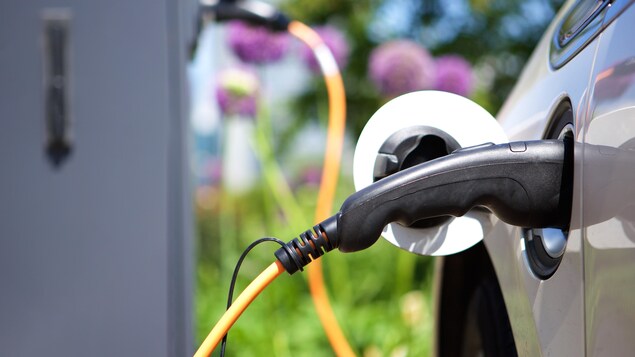By 2030, the requirements will reach 60% of all sales and by 2035, every passenger car sold in Canada must be electric.
Manufacturers or importers who do not meet sales targets may face penalties under Canada’s Environmental Protection Act.
Julie Dabrosin, parliamentary secretary to environment minister Stephen Guilbault, said Wednesday’s announcement was important to encourage companies to Increase the number of zero-emission vehicles offered across Canada
.
” One need only look at British Columbia and Quebec, which already have similar measures in place, to see that this is an effective mechanism. »
The federal government also plans to add 50,000 electric vehicle charging stations across the country, bringing the total number of funded stations across Canada to nearly 85,000 by 2027.
Ms Dabrusin also argued that the new government’s targets would give private investors Confidence to build a national freight infrastructure
.
off target
Canada still has a long way to go before it reaches the first target in 2026.
In the first six months of this year, sales of electric vehicles, including hybrid and all-electric vehicles, accounted for only 7.2% of new vehicle registrations. For 2021 as a whole, it was 5.2%.
Under the proposed regulations, which will be formally released on December 30, Ottawa proposes to track sales by issuing credits for car sales.
All electric cars and trucks deserve more credit than plug-in hybrid versions, although the government recognizes that plug-in hybrids are likely to remain in demand in rural and northern areas.
- British Columbia is the leader in electric vehicle sales, which account for nearly 15% of all new vehicles registered between January and June.
- Quebec comes in second with 11.4% of the number of enrollments.
- Ontario ranks third, with just 5.5% of electric vehicles among new registrations.
- The number is less than 4% in all other governorates.
The promise of elections
The new legal framework proposal delivers on the promise of the 2021 Liberal elections. It is part of the emissions cuts plan the government published in April.
This plan is Canada’s comprehensive roadmap for achieving its goal of reducing greenhouse gas emissions 40% to 45% below 2005 levels in all sectors by 2030.
Passenger vehicles account for half of all road transport emissions and about one-tenth of Canada’s total emissions from all sectors.
Canada already had electric vehicle sales targets. But it wasn’t enforceable, and the government failed to force automakers to increase the number of electric cars available for sale.
The new targets will be nationwide, though some provinces are already ahead of others.
more advanced provinces
Quebec and British Columbia already have provincial requirements. a It was published last week by the Canadian Climate Institute He concluded that the measures allowed the two provinces to outpace the rest of the country in the use of electric vehicles.
Anna Kandoth, a senior research fellow at the institute, argued that the global supply of zero-emission vehicles remains limited, although it is growing rapidly.
Automakers largely prioritize areas that have some sort of sales requirement
She wrote, adding that places with requirements have much higher approval rates for zero-emission vehicles and more model choices.
In response to the federal government’s announcement, the Bloc of Quebec made the same remark as Ms. Kandouth.
” The endless queues to buy an electric vehicle prove it: the population is ready and manufacturers must now follow the supply. »
Obviously, manufacturers must be forced to produce in order to increase the number of electric vehicles available for sale.
Montreal MP Monique Pauzi adds.
Correction: An earlier version of this Canadian press release erroneously stated that the regulations would take effect from 2025, instead of 2026.

“Music guru. Incurable web practitioner. Thinker. Lifelong zombie junkie. Tv buff. Typical organizer. Evil beer scholar.”







More Stories
Quebec Airport: 1.7 million passengers in 2023, but moderate growth over the next two years
Food intolerance: tests out of reach
Mont Sainte Anne: The world champion asks the Prime Minister to intervene